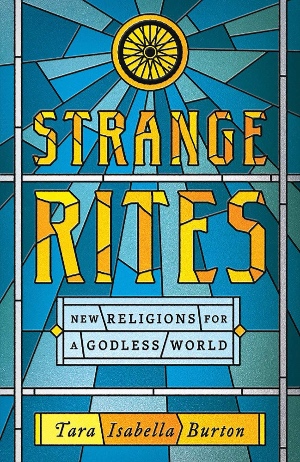Strange Rites by Tara Isabella Burton
A journey through the new, spiritually aware anti-religions that deny the existence of God
 Strange Rites - New Religions for a Godless World
Strange Rites - New Religions for a Godless World
By Tara Isabella Burton
PublicAffairs
ISBN: 978-1541762534
Reviewed by Terry Young
Most of us sense new forces sweeping the globe, anti-religions that deny the existence of God, yet are spiritually aware and active. These secular faiths are the subject of Tara Isabella Burton’s recent book. Although she focuses on the US, what she describes is reasonably familiar globally.
For Tara, a religion has four characteristics. Give or take a little precision in the definitions, they are:
-
Meaning: it provides a transcending narrative of the world now and how it must change.
-
Purpose: it provides direction and transcendent experiences for the convert.
-
Community: it provides environments where adherents may meet and practice.
-
Ritual: it provides behavioural structures to frame the transcendent experiences on offer.
Just as the printing press was the midwife to Protestant Christianity and privatised the way people found and checked revealed truth, Tara argues that the internet is birthing secular religions, providing the content, connections and environments through which they exist.
After a spot of history to get us into the secular faiths theme park, she takes us on the rides: fandom, wellness, today’s occult, and sexual utopia, before focusing on two movements we are all aware of: social justice warriors and the new traditionalists ranged against them. On the whole, the tone is descriptive – for instance, what you can see from the top of the wellness rollercoaster – and usually free of judgement: Tara is the tour guide, not the forensic accountant.
Of course, Tara has exercised judgement in pulling the themes together in the way she has, and the swathes of territory through which you pass leave you reliant on that judgement to some extent. You may also have to depend upon her take with the jargon that is inescapable on this topic, including a piece that comes with the admonition not to google it! My approach to sensing an author’s position when they talk about things I know little about is to find the places where I know a little more, and apart from wondering if she has been a little harsh on Jonathan Edwards, I found myself content to go with her flow.
It reminded me of Jonathan Aitken’s The Young Meteors which introduces 1960s London, with chapters on art, fashion, politics, and even crime. Instead of interviewing the principals as Jonathan did, Tara picks through what they have blogged, said, tweeted or written. That said, they have both sampled some of the wares. When I first read Jonathan, the soundtrack in my head was of an overheated Pathé News announcer; with Tara I hear a more reflective voice. But a sense of curiosity, of spectacle, of wonder even, pervades both.
Apart from its sweeping ambition in corralling politics, religion, work, hobbies, health and social attitudes into a coherent narrative, I liked the book’s historical reviews. None of this is quite as new as we think and some of it goes back a surprisingly long way. However, Tara believes that something different is now afoot and that the new movements are different: pendulums that have swung back and forth for centuries have hit something and are stuck in a new place. Whether she is right here or whether right-wing atavists are more dangerous than social justice warriors (one of her few departures into clear judgement), only time will tell.
My takeaways were, first, the anger around secular faith. The redemption story always involves cleansing ourselves, sometimes in our own sweat, usually in other people’s tears. In anger, something somewhere has to be torn down: its high priests and adherents torn apart for us to be made whole. In a sense, these faiths have captured a violence and destruction that is at the heart of redemption and that embarrasses most Christians, but their motivational anger and their compulsion to direct it against others is sad. So, there is a redemption theology, and it is almost right in places.
Second, I was impressed by the enduring need for meaning and purpose and by the way that secular faiths claim to meet them. When I was a student engaging with the big metaphysical questions, my problem with atheism was that if everything came by accident, then not only does nothing really matter, there is no possible way that it can matter. Until I came across Paul Erdos (The man who loved only numbers) a couple of decades later, I found nobody who even tried to live as though life didn’t matter: everyone chose to dress, eat and argue as though it did (and even Erdos’ escape from convention was trashed by his wonderful commitment to doing meaningful maths). The transcendent leap from what is to what might be still needs something like faith. And there is a theology that is almost right in all this, too.
I found myself wondering what sort of faith Tara has. Elsewhere, she describes a journey which once led her to being the most conservative goth she knew and the most liberal theologian at the same time, before finally coming home as a Christian.
If you long that more of the secularly religious should come home, too, this is probably a book you can’t dodge.
Professor Terry Young is an author and member of a Baptist church. He set up Datchet Consulting which combines his experience in industry and academia
Baptist Times, 24/09/2021